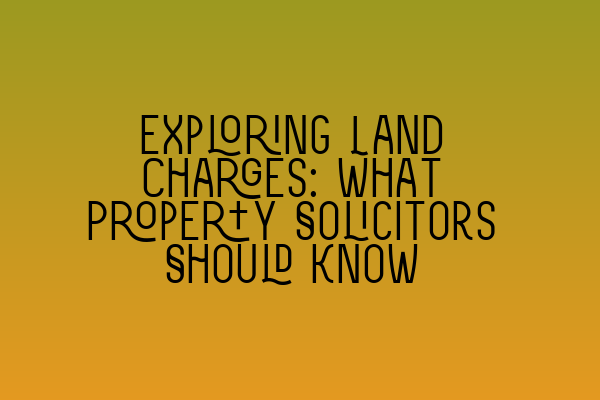Exploring Land Charges: What Property Solicitors Should Know
As a property solicitor, it is crucial to have a comprehensive understanding of land charges. Land charges are legal interests or rights that affect a particular property. These charges can have a significant impact on the ownership, purchase, and development of land. In this article, we will explore the concept of land charges and highlight key information that every property solicitor should know.
Types of Land Charges
There are various types of land charges that property solicitors come across in their day-to-day work. It is essential to be familiar with each type to effectively handle property transactions:
- Restrictive Covenants: Restrictive covenants are obligations that limit how a property can be used or developed. These covenants are usually imposed by previous owners or developers and can be found in property deeds. It is crucial to identify any restrictive covenants when advising clients on property transactions as they could affect future plans or development of the land. A thorough examination of the property’s title and relevant local authority searches can help uncover any existing restrictive covenants.
- Mortgages: Mortgages are a common type of land charge that property solicitors regularly encounter. When a property is mortgaged, the lender holds a legal interest in the property until the mortgage is fully paid off. As a property solicitor, it is important to ensure that all necessary documentation related to mortgages is in order, including liaising with the lender to obtain the necessary discharge or transfer of the mortgage.
- Easements: Easements are rights granted over someone else’s land for a specific purpose. Common examples include rights of way, drainage rights, and rights to access utility services. It is crucial to thoroughly examine the property’s title to identify any existing easements and advise clients accordingly. This is especially important when clients are planning on developing the land or making changes to existing structures.
- Notices: Notices are land charges that can affect property transactions. These can include notices of pending legal proceedings, planning applications, or other matters that impact the property’s legal status. As a property solicitor, it is essential to obtain and review all relevant notices to ensure clients are fully informed about the property they are purchasing or dealing with.
- Charges Register: The Charges Register is an official record of all the charges registered against a property. This includes mortgages, loans, and other financial interests that may affect the property’s ownership. It is crucial to conduct a comprehensive search of the Charges Register to identify any outstanding charges or interests that could impact a property transaction.
As you can see, land charges are a complex area of property law that requires careful attention to detail. Failure to identify and address land charges can have serious implications for property transactions and the subsequent ownership of land.
Why Property Solicitors Should Prioritize Land Charges
Understanding and effectively dealing with land charges is crucial for property solicitors for several reasons:
- Safeguarding Clients: By thoroughly investigating and addressing land charges, property solicitors can protect their clients’ interests. Identifying any potential limitations or risks associated with a property ensures clients can make informed decisions and avoid costly legal disputes in the future.
- Compliance with Regulations: Property transactions must adhere to various legal regulations and requirements. Failure to identify and address land charges can result in non-compliance, putting the transaction at risk and potentially exposing the solicitor and clients to legal consequences. By prioritizing land charges, property solicitors can ensure compliance with all relevant regulations.
- Smooth Transactions: Dealing with land charges promptly and effectively can streamline property transactions. By identifying and resolving any issues related to land charges early in the process, property solicitors can minimize delays and complications, ensuring a smooth and efficient transaction for their clients.
Now that we have established the importance of land charges, it is crucial to discuss how property solicitors can effectively handle them.
Handling Land Charges
Proper handling of land charges requires a methodical and detailed approach. Here are some key steps that property solicitors should take when dealing with land charges:
- Thorough Due Diligence: Conduct a comprehensive examination of the property’s title and relevant searches to identify any existing land charges. This includes scrutinizing the property’s deeds, conducting local authority searches, and reviewing the Charges Register to ensure no charges are missed.
- Clear and Concise Communication: It is essential to communicate clearly and concisely with clients about any land charges that may impact their property transaction. Ensure that clients understand the implications of these charges and provide appropriate advice on how to address them.
- Negotiation and Resolution: In some cases, property solicitors may need to negotiate with relevant parties to resolve certain land charges. This may involve obtaining consent from previous owners, lenders, or other interested parties to modify or discharge the charge.
- Documentation and Legal Compliance: Prepare and review all necessary documentation related to land charges, ensuring compliance with legal requirements. This includes drafting agreements, obtaining necessary consents, and ensuring proper registration of any modifications or discharges with the relevant authorities.
Conclusion
Land charges play a crucial role in property law and can significantly impact property transactions. Property solicitors must have a thorough understanding of the various types of land charges and the necessary steps to address them properly. By prioritizing land charges and following a systematic approach, property solicitors can protect their clients’ interests, ensure compliance with legal regulations, and facilitate smooth property transactions.
For more information on preparing for the SRA’s SQE exams and gaining expert knowledge in property law, consider enrolling in our comprehensive SQE 1 Preparation Courses and SQE 2 Preparation Courses. Stay updated with the latest SRA SQE Exam Dates and test your knowledge with our SQE 1 Practice Exam Questions and SQE 1 Practice Mocks FLK1 FLK2.
